First Russian People's Republic "Zheltuga"
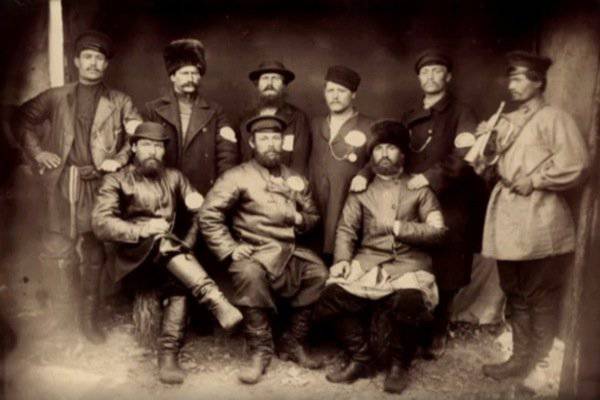
The Zheltuga Republic in the Amur region lasted only three years, from 1883 to 1886. But this is the only experiment in the last two hundred years (before that, the Cossack republics on the Don and Kuban), when the Russians managed to create - and very successfully - statehood from below. True, the leadership of the republic had to be given to the German president and the Baptists.
Immediately explain about the "only experiment." Yes, there were dozens of “projects of neoplasms” in Russia - from the Northern Republic of the Social Revolutionaries in 1918-1919 to the Lokot Republic and the Republic of the Old Believer Zuev in 1941-43. But all of them, one way or another, if they were lined up from below, then under the close supervision of either the occupiers or the remnants of the Russian statehood (“white” and “red” in the Civil). There were projects and "peasant" republics in the same civil (from Antonov to Makhno), but they existed for a few months, besides having not managed to create a coherent legal system of statehood (the Constitution).
Only Zheltuginskaya Republic possessed all the qualities of a so-called. "People's State" - built from below, held general elections of government, the Constitution was written. ProtoUSA, it was not without reason that she received the second, unofficial name “Russian California” - her “citizens” considered America as the ideal.
In the spring of 1883, large gold deposits were discovered on a tributary of the Amur River, the Zheltuga River. And thousands of people rushed to these mines. If by the autumn of 1883, about 1 thousand people lived here, then by the end of “statehood”, about 1886 thousand people lived in 14.
Legally, this territory belonged to China, defended kilometers on 5-10 from the border with Russia. But in this remote, wooded land to the beginning of the work of the mines there were no officials, nor the security forces of both countries. The ideal situation for organizing life as you wish.
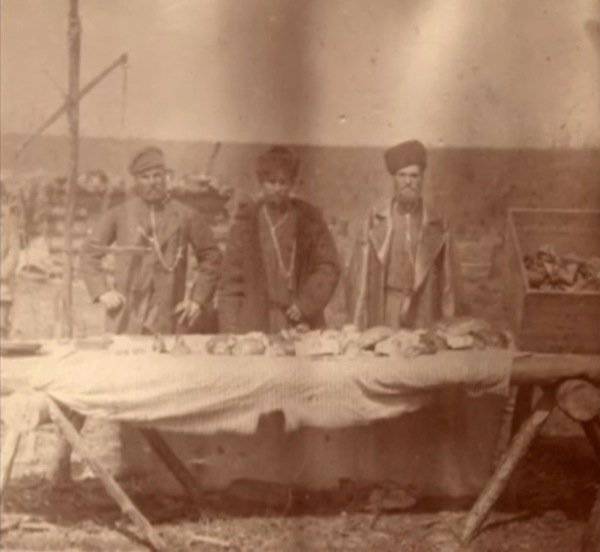
The colonists immediately chose artel property in this territory. The brigade usually consisted of 10-15 people, each accounted for several tens of meters along the creeks and the river itself (usually the 3-4 pit). The first leadership of the people who arrived here took the union of artels - the first settlers. Also, in fact, the American situation is almost the first ship of the Mayflower colonists of the founding fathers of the United States.
And immediately in the newly formed colony everything went awry. Informal leadership on Zheltug was captured by the Urkagans — runaway convicts, “spirinthos”, as well as all sorts of adventurers who traveled here from all over the world. The artel workers were robbed - and there was no one to look for protection from anyone, the truth-seekers were simply killed, gambling houses bred in the town, almost indiscriminate drunkenness and fornication reigned. On the latter should pay special attention. At the very beginning of “statehood,” the union of artel workers decided that there would be no women here, supposedly, where a woman is, there is stabbing and corruption. And Zheltuga plunged into homosexuality. Later, the Pole Nosovsky wrote that "half of the population of the colony fell into this sin, even the former peasants, who, it seemed, should be resistant to morality."
The final straw was the December X murder of a local chef. They didn’t just kill him — it’s a huge success, they killed him every day — but they also chopped it to pieces. So the urkagans wanted to show "who is the power here."
The artels' union, which seemed to have lost its political influence in the colony, was able to defy this outrage. This union met weekly. The outcome of the gatherings was a decision that the “republic” needed a president and a parliament. Moreover, the president should be “small combat, so that was the power to resist the nits.”
At the general gathering, it was decided to divide the mine according to the number of winter quarters into five plots, which received the name of the states (4 hut was “white”, 1 - Chinese). In each state, residents had to choose from their midst two elders for a period of 4 a month.
At the head of the republic was the "foremen", or "president" - he was elected by universal suffrage in all five states. State representatives - 10 people, formed the parliament. The meeting established three basic principles of the existence of the “Russian California”: the election of self-government bodies, the association of artels (the code of economic relations), and the body of laws that formed the Constitution. With all the insoluble contradictions established the supremacy of the "law of Moses", i.e. Old Testament (and in this, too, refer to the United States, where the Bible - one of the foundations of the state).
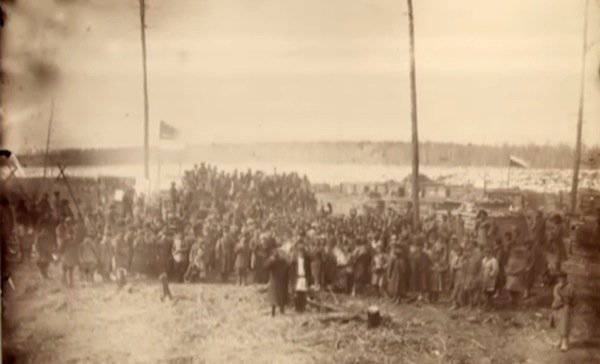
The first president was Karl Karlovich Fosse, an Austro-Hungarian citizen from Trieste. According to one version, his name was Adolf Karlovich Fass, and he was from Austro-Hungarian Bohemia. Finally, there was a third version of his name - Karl Karlovich Ivanko - a Germanized Rusyn, originally from the territory of present-day Slovakia. Such a discrepancy was due to the fact that Zheltuga was a place where people from all over the world flocked to, many were at odds with the law, and even here they preferred not to reveal their true biography. Undoubtedly there was only one thing - the first president was at least a former subject of Austria-Hungary and a carrier of German culture.
Looking ahead, we say that the mountain master Yeremey (Jeremiah) Sakharov, a Molokan (Russian Baptist), originally from Georgia, was chosen as the second president of the “Russian California”.
Germans and Russian sectarians in general prevailed in all elected bodies of power. The 10 members of the first parliament of 2 were Chinese (this is understandable - they were elected from the state inhabited only by the Chinese), 5 Russian sectarians (Molokans and Old Believers), 1 Ostsee German, 1 Russian (drop student from St. Petersburg) and 1 Polish . In the following parliaments, this ratio of Russian sectarians (half) and immigrants from Europe or from the western borders of the Russian Empire remained.
The entire administrative and judicial power was in the hands of the president and the parliament. The elders resolved cases of a civil nature and minor criminal cases, the punishment for which did not exceed 100 strikes (the main punishment in Zheltug was corporal, there were no prisons here). The headman was obliged to report on each case of punishment to the president. Together, the elders formed the first instance of the court. All other serious matters were decided by the president, acting as a second instance. The category of the most serious crimes was murder. The court ruled on it a public gathering - that is element of direct democracy, at the same time a referendum and a jury. The signal to the general meeting was a shot from two cannons located on Orlikovy field. A shot from one gun convened on the board of elders.
Laws formed a kind of "constitution" of the Zheltuga Republic. Following its laws was obligatory for all who lived in the territory of the “Russian California”. The constitution was recorded in five copies and was sent to the states, where after reading it out loud by the foreman, all the prospectors were obliged to sign it.
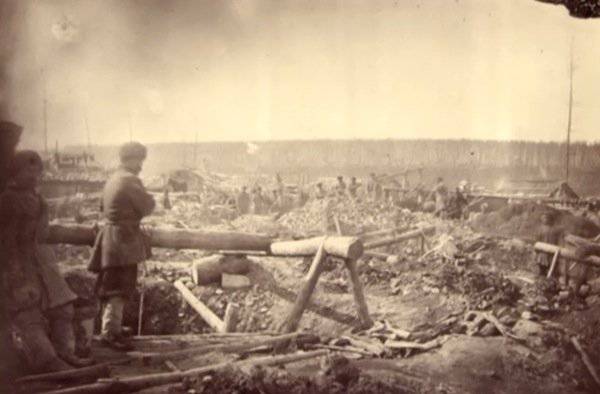
Despite the fact that one of the elements of the control system was the Old Testament, there was no particular external religiosity. In spite of the fact that about 40% of the population were Orthodox, over the 3 year of the republic’s existence, they did not put up a church here and did not bring a priest. And the representatives of the other confessions had one prayer house, which was run by the fugitive convict Solomon, a Molokan. Above the entrance to the prayer house, the inscription “Come to me, all who labor and burdens, and I will give you rest.” Molokans, Lutherans, Old Believers, Catholics, etc. they prayed here one by one; someone from their midst who knew the Scripture best of all acted as a “priest”. One of the first decrees of the President Karl Karlovich abolished church ordinances wedding, funeral, baptism as mandatory (this was the rule in the Russian Empire). In fact, it was in Russia the first case of separation of the church from the state.
Well, the first decree of the president was the abolition of the former norm of non-admission of women to Zheltuga. Fausse led a fierce struggle against homosexuality, which struck the local society. Xenum was supposed to be lashed with lashes - in fact it was an analogue to the death penalty. Among other similar penalties were - 500 strikes with a stick for night noise, for open drunkenness - 200 rozog. Each punished person was expelled from the village without the right of return, and at the colony border he also received 100 additional strikes. Incidentally, people from local, Siberian and Far Eastern nationalities — Buryats, Orochi, etc. — were taken to executors. - so that those do not have attachment to any community. The settlers themselves acted as militiamen — “decent people,” elected at a gathering in each state.
In the first month of his work as president, Fose ordered the establishment of a hospital. There were 15 beds with soft felted bedding, clean white sheets, straw-filled pillows, and biker blankets. A pharmacy was located in the second chamber. In the third - an outpatient department for incoming patients. In the fourth ward there was a hospital maid, there was also a kitchen. Patients admitted to the hospital were treated at a public expense and were fully provided for - morning and evening tea, breakfast and a three-course dinner. Maintenance of the patient cost in 3-5 rubles per day, a lot of money for those times. In a month, 1,5-2 thousand were running. Moreover, it was necessary to maintain a circus (athletes, magicians and fighters worked there at the rate), a fire station, to equip the city, etc. The president himself was given a salary of 400 rubles per month (as a general in the Russian Empire), headmen deputies - for 200 rubles per month, a lot of money. Where did the republic take the money?
Parliament has established such a tax system. Each merchant had to contribute 10% of the value of their goods to the treasury. Those who sold vodka and other alcoholic drinks paid 25%. The owners of the taverns and places of entertainment rented 20% monthly income. Casino owners (there were two rooms with a roulette here) - 80% of revenue. The personal incomes of the gold mine workers were not taxed (the income tax system was almost never used in the world at that time).
By the end of 1885, crime in the colony was almost defeated (at least severe), homosexuality disappeared (in a year about 1 thousands of women arrived here, half of them were Chinese women, they were also the main workers of brothels) postal and trade relations were established with trading posts on Russian territory.
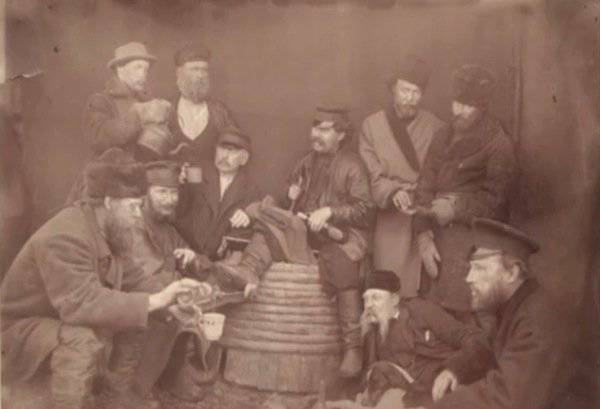
Of course, such a republic could not go unnoticed - neither in Russia, nor in China. Information about her began to reach ordinary people (for example, there were several reports in the press of Irkutsk). And it already smelled of serious sedition, and could undermine the foundations of both despots. In the early spring of 1886, Russian and Chinese troops arrived here. The Chinese executed their subjects, the Russians simply dispersed, after first identifying the fugitive convicts.
Karl Karlovich Fosse, by the way, left for California. There his tracks were lost (perhaps, once again, he just changed his name). Part of the "Russian Californians" moved to the gold mines on the river Gilyuy, right there, in the Amur region. There they created an analogue of the Zheltuga Republic - Gilyuiskaya, which, with interruptions, existed right up to the 1922 year - however, without much scope (with a claim to its own statehood).
“It cannot fail to amaze the fact that this multi-thousand colony, united by a thirst for profit and formed from extremely unreliable mixed ethnic elements, was able to come to the conclusion that it was necessary to form a strong centralized authority based, remarkably, solely on Russian principles of state-building and in the spirit Russian traditions. Zheltuga is an amazing example of people's self-organization, which developed laws based on its own practice, ”writes one of the modern historians about this republic.
True, he forgets to point out that traditions may have been Russian (in the spirit of the Novgorod and Pskov Republics), but statehood began to take shape only under the German ruler and “Russian Protestants” - various sectarians with their traditions of honest labor and distribution responsibility.
The Zheltuga Republic is a lesson for those Russians who in the future will be engaged in state-building in a renewed Russia. And a good example for skeptics who believe that Russians are not capable of self-organization. Capable - but under the leadership of the elite with a Protestant spirit.
Information